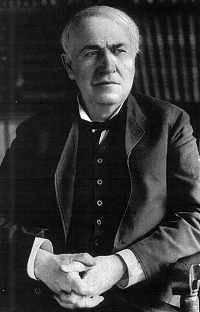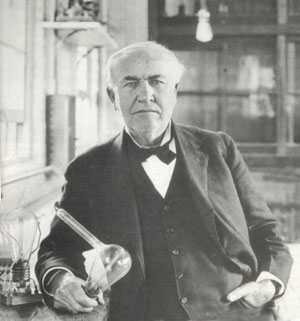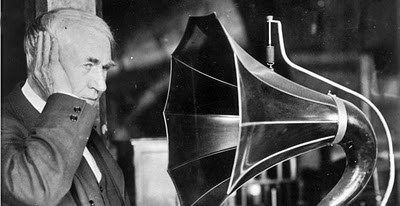Throughout
the past, there have been many great minds that have shifted the course of
history forever. Thomas Edison was one such mind. Thomas Edison was born to
Samuel and Nancy Edison in the town of Milan, Ohio. Though he was a smart kid,
his teachers at school did not recognize his way of learning and considered him
"addled," so his mother home-schooled him throughout the rest of his
childhood. As a teenager he got a job selling newspapers and candy on a train.
When he had free time on the train he experimented with substances in a lab he
set up in the cargo car. While working at the lab, he knew creating
things is what he wanted to do for the rest of his life. He eventually created
a lab in Menlo Park just for experimenting and patenting (Endersby, Linda
Eikmeier). Throughout his life he created multiple inventions, lots changing
the lives of the world forever. By doing so, he was called a hero of the people
back then and today. A hero must possess certain qualities to be considered
one. One is to be selfless, or to put others before you. Another is to have
determination and to be able to push through obstacles. Thomas Edison is a hero
because of his determination, his ability to push through obstacles, and his
selflessness.
 |
| Thomas Edison (http://inventors.about.com/library/inventors/bledison.htm ()) |
One of Edison's most profound
traits as an inventor was his determination. This was key to the creation of
many of his most famous inventions. One of his most important inventions, the
incandescent light bulb, was one of the hardest to create. Although he was
determined to create it, "Edison's electric lighting venture was a subject
of controversy. Others had tried and failed, and the scientific and technical
communities were divided over his prospects. His reputation, though, was
formidable" ("Detailed Biography - The Edison Papers."). All
people who had previously tried to solve the problem of keeping a light bulb
illuminated had failed. That did not discourage Edison though. He assembled a
proven team of inventors to help him on his newest project. Even with his
previous knowledge of inventing and his strong reputation "Edison had a
tough time of it, going through a long, trial-and-error process in which he
tested thousands of materials" ("Thomas Alva Edison." World
of Invention). Edison had to endure thousand of failing experiments, each
adding more stress and discouragement to his team. Hope and determination
flooded out of everyone but Edison. Because he was "undaunted by failures,
Edison finally found that a scorched cotton thread would work best. When heated
in a vacuum, it produced a white glow without melting, evaporating, or
breaking" ("Thomas Alva Edison." World of Invention). His
determination had finally paid of unveiling the greatest invention of the
century. With an age dawning where you could use electricity to power anything
you need, all thanks were given to Edison and his determination to create such
things. In fact, his determination was one of the greatest factors to his
successes in his career. Without it, he would have given up on many of his
greatest inventions and thousands of his smaller ones.
 |
| Edison with his light bulb (http://www.nndb.com/people/333/000022267/ ()) |
Edison never wanted to stop or slow down on creating things. He wanted to become one of the greatest engineers in the world. But, many obstacles stood in his way to becoming a legend. These obstacles had the potential to slow him down to a stop. This is where Edison showed his most powerful traits: his ability to push through obstacles. For example, "After his attempt to demonstrate a new telegraphy system failed, Edison, with not a dime in his pocket, departed for New York to seek his fortune. The gold-market scandals of the day caught Edison's attention when he took a job at the Gold Indicator Company soon after coming to New York" ("Thomas Alva Edison." World of Invention). Through complete failure, Edison did not give up. He only used the opportunity to exploit his options. Because he pushed through the hard times of poverty and depression, he landed a good job at a telegraph company. After he left New York, he began to become deaf. Many believed it was result of a childhood experience but, "No matter the cause, this affliction had a profound effect on his life" ("Thomas Alva Edison." Scientists: Their Lives and Works). Because he began to become deaf, he was no longer able to work well as a telegraph operator. Though this discouraged him, he continued to make a living by creating new patents. Eventually, the only way he could hear anything was if someone shouted at him right in his ear. This, as discouraging as it may seem did not stop him. Instead he "grew increasingly solitary and studious. He also became more serious about his experiments" ("Thomas Alva Edison." Scientists: Their Lives and Works). Though he was crippled, it did not stop him from continuing his work. If anything, it caused him to get better at inventing. It focused him, and lead him to the creation of some of his greatest patents. Edison's life was full of challenges. Though they crippled him and made him struggle, it did not stop him. He learned to get through the pain and to keep moving forward. This made him from a great engineer to a legendary one.
 |
| Edison with his Phonograph (http://funnywebpark.blogspot.com/2010/09/americas-greatest-entrepreneurs.html ()) |
Thomas Edison was undoubtedly one of the greatest
inventors of his time. He created things that others would not even dream of
attempting to make. His reputation spread like a wildfire across America. He
had created things that had changed the lives of Americans forever. Within his
golden years of inventing at Menlo Park, "Edison made it his goal to
produce a new invention every ten days, and during one four-year period, he
obtained an average of one new patent every five days, earning him the nickname
the Wizard of Menlo Park" ("Thomas Alva Edison." World
of Invention). People in his time were amazed with his skill in inventing
and grateful for it. To the people of the time, he was considered a hero all
around the country. Not only did he create many little things to improve
society but also, "During his peak years, he produced some of the greatest
technology the world had seen for a long time" ("Thomas Alva
Edison." Scientists: Their Lives and Works). Many of these
great inventions were called either fakes or magic because of the amazing
achievements they could accomplish. Instead of daunting him, this criticism
spurred him on to produce a large demonstration of his product, showing the
world his accomplishments. Some of these amazing things, like the light bulb
and the phonograph impacted our society forever. These inventions set the basis
of many things we see today like modern iPods. Without his great works, things
like this would have taken another century to develop.
Edison was a hard
working, determined engineer. Edison kept on inventing and kept on exploring
new places in engineering. He made things people thought impossible and by
doing so he created a brighter future for the world. Because of this, he is considered
a hero to people all around the world. Thomas Edison inspires me because of his
determination to his work, and the way he pushes through obstacles. He kept
failing and failing, but kept trying. He never gave up on his goals or his
dreams and he wasn't going to let anyone stop him. This has caused me to follow
his example when I have needed to stay determined and get over the hard things
in life. His example has shaped me into a better person and inspired me to
continue to shine. If the world would follow the example that he set, wouldn't
the world be a better place for us all?
Work Consulted
Endersby, Linda Eikmeier, and Endersby Linda Eikmeier.
"Thomas Alva Edison." Great Lives From History: Inventors &
Inventions (2008): 1. Biography Reference Center. Web. 8 May 2012.
"Thomas Alva Edison." Gale Encyclopedia of U.S.
Economic History. Ed. Thomas Carson and
Mary Bonk. Detroit: Gale, 1999. Gale Biography In Context.
Web. 9 May 2012.
Frost. "Thomas Edison: The Man Who Brought The 20Th
Century To Light." Biography 3.10 (1999): 104. Biography
Reference Center. Web. 9 May 2012.
"Detailed Biography - The Edison Papers." Detailed
Biography - The Edison Papers. Rutgers
University, 20 Feb. 2012. Web. 09 May
2012. .
"Thomas Alva Edison." Scientists: Their Lives
and Works. Gale, 2006. Gale Biography In
Context. Web. 10 May 2012.
"Thomas Alva Edison." World of Invention.
Gale, 2006. Gale Biography In Context. Web. 10
May 2012.
"Thomas Edison - The Inventions of Thomas Edison."
Thomas Edison - The Inventions of
Thomas Edison. About.com, 2012. Web. 18 May 2012..
"Thomas Edison." Thomas Edison. NNDB, 2012.
Web. 18 May 2012..
"America's Greatest Entrepreneurs - Funnywebpark."
America's Greatest Entrepreneurs -
Funnywebpark. Funny Webspark, 2012. Web. 18 May 2012.
Page created on 5/20/2012 12:00:00 AM
Last edited 5/20/2012 12:00:00 AM
